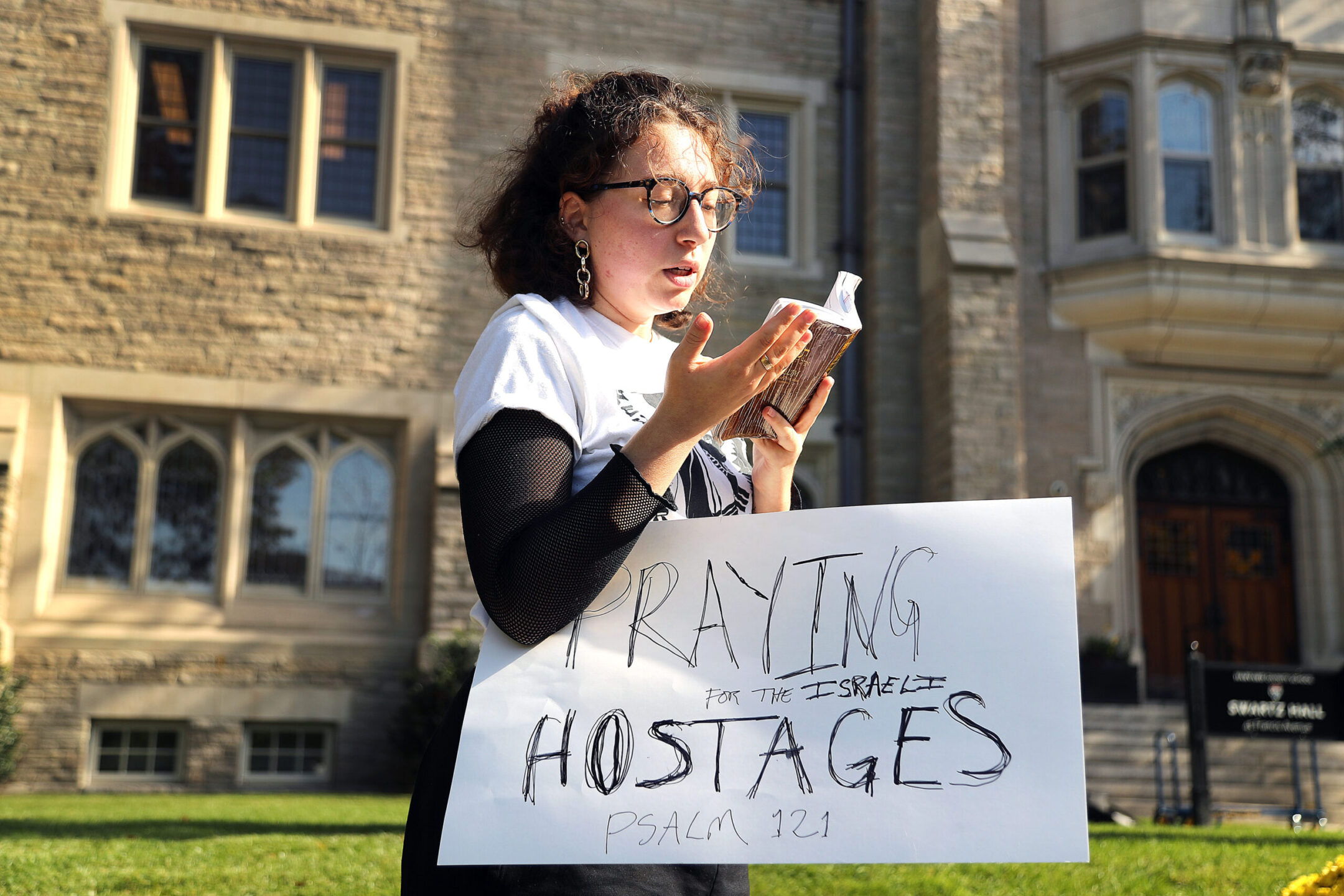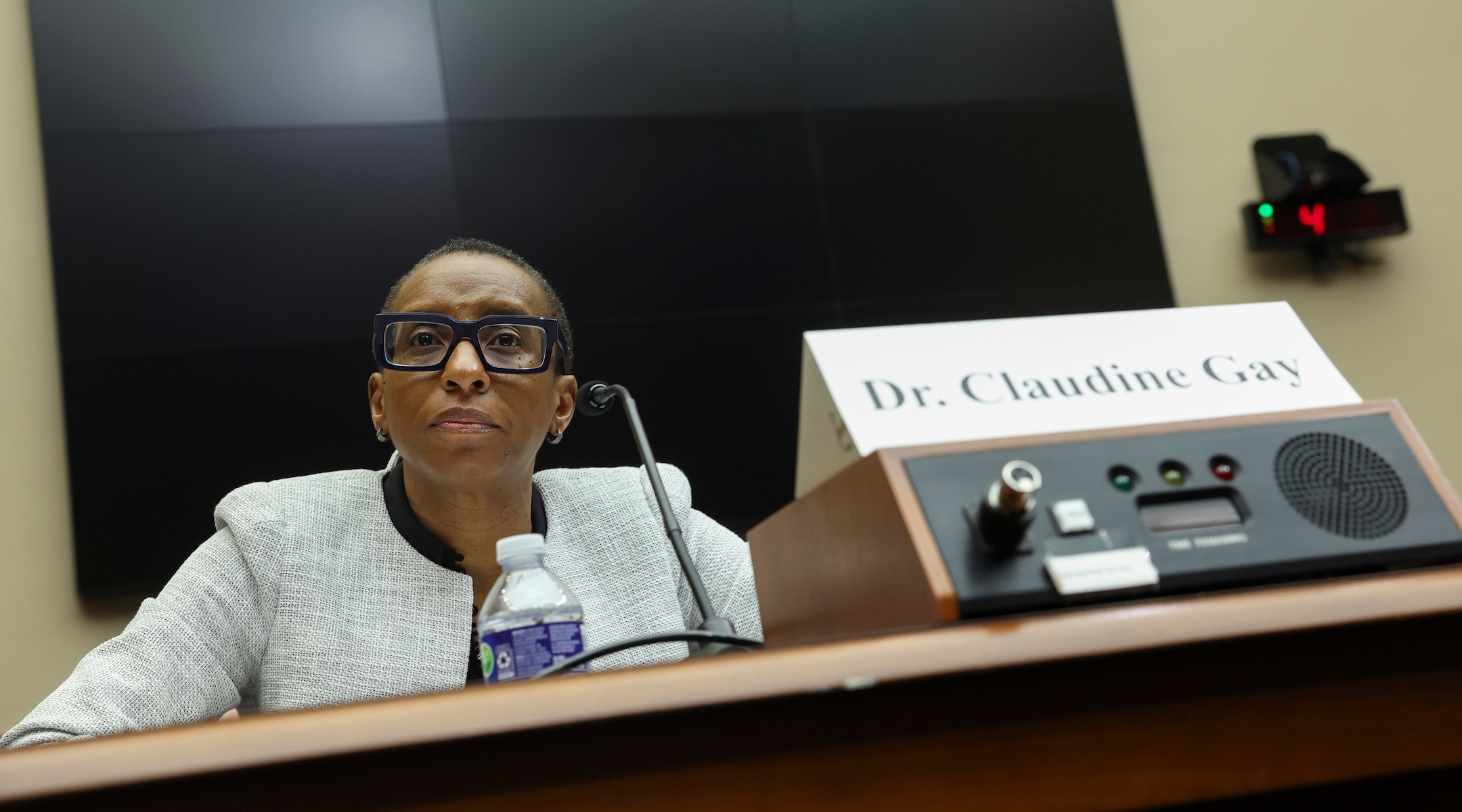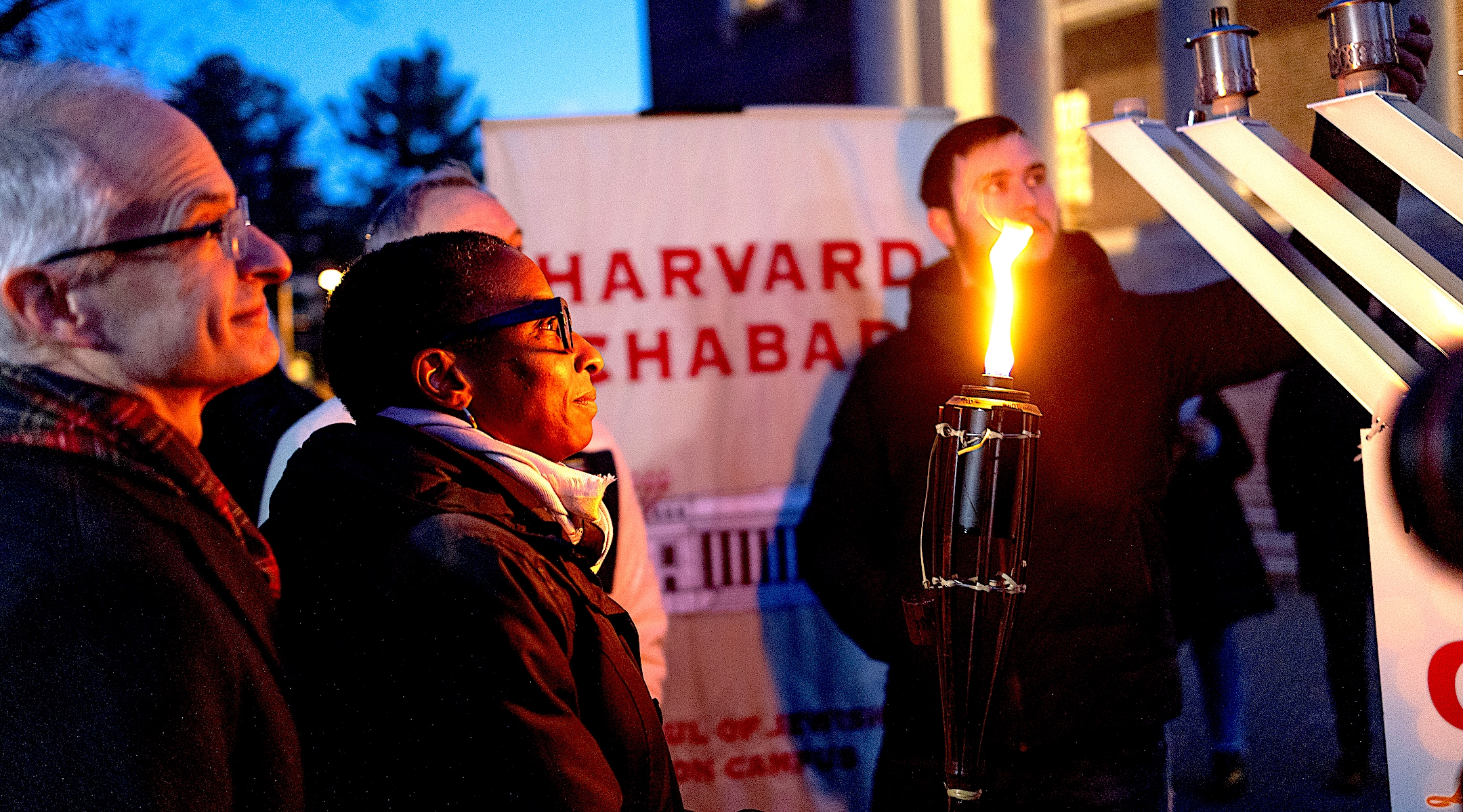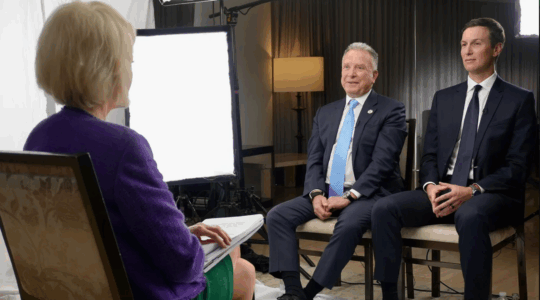(JTA) — The pressure that built on Harvard’s president, Claudine Gay, to resign began after what many thought was a tepid campus response to the Hamas attacks of Oct. 7. It mounted following a disastrous congressional appearance in which she and two other university presidents gave lawyerly answers in response to grilling about antisemitism on campus.
But by the time Gay actually did resign this week — following a flurry of plagiarism allegations that drained her support — the antisemitism debate was relegated largely to the sidelines.
Instead, thanks to outside political actors — and deep-pocketed insiders with an array of ideological axes to grind — the resignation of Harvard’s first Black president took on wider significance than a campus dispute over antisemitism and free speech. As a result, Jewish concerns about antisemitism receded — or have been attached to other issues in ways that are already heightening Black-Jewish tensions and drafting Jews into ideological battles many never signed up for.
Some Jewish groups appear to be laying low lest they get drawn into the discourse.
“We didn’t call for her head,” Laura Shaw Frank, the director of Contemporary Jewish Life at the American Jewish Committee, said in an interview. “What we want is to create campus spaces that are secure and positive experiences for Jewish students and Jewish faculty and Jewish members of the community. We are under no illusion that a president is the only person who dictates campus culture.”
AJC did not issue a statement on Gay’s resignation. “That doesn’t mean we like what happened at the congressional hearing, which was absolutely horrible,” said Shaw Frank. “But the fact that there have been people who are calling for her resignation doesn’t mean that the entire Jewish people should be labeled as fighting for her resignation.”
Among the Jews seeking Gay’s ouster — and shaping the discourse around her presidency — was Harvard grad Bill Ackman, a Jewish hedge fund manager and Harvard donor who tied her tenure to the fight against Diversity, Equity and Inclusion, or DEI, whose most vocal opponents are conservatives who say DEI programs instill a rigid leftist ideology. In a lengthy post on X after Gay stepped down, Ackman said Havard’s DEI office expresses a philosophy that is the “root cause of antisemitism at Harvard.”
“This is the beginning of the end for D.E.I. in America’s institutions,” agreed the conservative activist Christopher Rufo, who played a lead role in spreading the plagiarism allegations, in response to Gay’s resignation. In a Wall Street Journal essay Thursday, Rufo boasted about the “reputational, financial and political” campaign he orchestrated to “squeeze” Gay out.
Defenders of Gay in turn fired back against a campaign they saw as racist, sexist and whipped up by the anti-woke right. “So they’re using the guise of pretending that this is about concern over antisemitism, which is, of course, something that all of us should be concerned about. It’s really just furthering their propaganda campaign against racial equity,” Nikole Hannah-Jones, the New York Times journalist who faced conservative attacks in a tenure battle at the University of North Carolina, told CNN.
Perhaps because the discourse around Gay had become so muddied — involving plagiarism, charges of misogyny and racism, conservative attacks on DEI, donor pressure, questionable leadership and antisemitism — many of the major Jewish groups were either silent or muted in the wake of her decision. One of the few statements forthrightly welcoming her resignation came from a group that didn’t exist before the war: the Harvard Jewish Alumni Alliance, launched in November to fight what it called “a toxic culture on campus.”
“In her repeated failures to condemn calls for complete and utter obliteration of Jews, Claudine Gay tacitly encouraged those who sought to spread hate at Harvard, where many Jews no longer feel safe to study, identify, and fully participate in the Harvard community,” spokesperson Roni Brunn said in a statement.
The Zionist Organization of America also called for Gay’s dismissal.
The most important of the groups fighting antisemitism, the Anti-Defamation League, issued a terse statement alluding to the plagiarism charges, saying “leaders at the highest level are accountable to the highest standards. Whoever emerges to lead the university must embody the highest ideals of integrity and demonstrate moral clarity and total commitment to fight antisemitism with #ZeroTolerance in a way we have not fully seen at Harvard.” (The ADL declined a request for further comment.)
Harvard Hillel was similarly circumspect in its statement.
“The most important priority for Harvard Hillel is that our university is a safe and inclusive environment for Jewish students and for all students,” Getzel Davis, whose title at Hillel is campus rabbi, said in its statement. “We look forward to continuing to work with the next president of Harvard and the rest of the senior University administration, to ensure that Jewish students are able to safely express their identities on our campus.”
Davis said Thursday he did not have time in his schedule for an interview.

A woman prays aloud for the Israeli hostages outside the Harvard Divinity School, Oct. 25, 2023. (John Tlumacki/The Boston Globe via Getty Images)
Such groups may have had good reason to be cautious in claiming Gay’s resignation as a victory, especially when some defenders of Gay were accusing Harvard of submitting to pressure from powerful Jewish and pro-Israel alumni, including Ackman, investor Seth Klarman, businessman Len Blavatnik and Lloyd Blankfein, former chief executive of Goldman Sachs.
“How sad but predictable that the same figures and forces enabling the ethnic cleansing and genocidal attacks on Palestinians in Gaza — Ackman, Blum, Summers and others — push out the first Black woman president of Harvard!” wrote the African-American philosopher and presidential hopeful Cornel West, a former member of the Harvard faculty, on X.
West appeared to be referring to Edward J. Blum, a conservative Texas legal activist, and former Harvard president Lawrence H. Summers. Both are Jewish. Blum’s nonprofit led a successful challenge to Harvard’s affirmative action policies earlier this year but Blum has not appeared to weigh in on Gay’s current woes. Summers had tweeted on Oct. 9 that he was “disillusioned and alienated” over Harvard’s response to Oct. 7 but also did not call for Gay to step down. When she did, he issued a statement saying he admired Gay “for putting Harvard’s interests first at what I know must be an agonizingly difficult moment.”
West’s statement went on to connect charges of racism with support for Israel. “This racism against both Palestinians and Black people is undeniable and despicable!” he wrote. “I have experienced similar attacks from the same forces in academia with too many of my colleagues remaining silent! When big money dictates university policy and raw power dictates foreign policy, the moral bankruptcy of American education and democracy looms large!”
Conspiratorial sentiments like West’s — accusing wealthy pro-Israel donors of “dictating” both university and foreign policy — may not represent the Black mainstream. But even Black leaders who often ally with Jews and against antisemitism were disturbed that legitimate concerns about antisemitism and speech on campus morphed into a challenge to DEI and the credentials of the first Black president and only second woman president in Harvard’s history.
“We start with the conversation about how to protect Jewish students and end up in a conversation about an assault on programs that benefit Black and brown people,” Cornell William Brooks, a professor at Harvard’s Kennedy School and the former president and CEO of the NAACP, said Wednesday on CNN. “It’s really about an attack on higher education, anti-DEI, and the reason we know that is because her critics spend more time talking about DEI and affirmative action than they talk about the legitimate concerns about antisemitism.”
A Jewish communal leader who asked not to be named because they wanted to protect their relationships with colleagues in the community said they had heard similar comments from Black allies. Like Brooks, such allies are wondering where the defense of Jewish students ends and the attack on DEI begins, and are asking if Jews are more interested in a conservative agenda than the fight against antisemitism.
As a result, many see signs of yet another clash between two groups with a history both of cooperation and deep tension.
“We already are seeing the backlash,” said Derek Penslar, a professor of Jewish history who directs Harvard’s Center for Jewish Studies. “With so many reasons for Jews and Blacks to work together, it is tragic to see these kinds of wedges driven between them.”
Amy Spitalnick, CEO of the Jewish Council for Public Affairs, said it is important to understand how Gay’s fall is being perceived by people of color who have allied with the Jewish community, and how antisemitism was “weaponized” to bring down Harvard’s first Black president.
“That doesn’t take away from the ways in which [Gay] needed to be held accountable for Harvard’s failures,” said Spitalnick, whose organization’s affiliated Jewish “community relations” councils often do interfaith and intergroup work. “Two things can be true at the same time: The congressional testimony that the presidents gave was horrendous and certainly was indicative of a larger failure on their part in terms of protecting their students. And there were extremists who exploited this situation in a way that doesn’t make any of us safer.”

Claudine Gay, president of Harvard University, testifies before the House Education and Workforce Committee on Dec.5, 2023 in Washington, DC. (Kevin Dietsch/Getty Images)
Jeremy Burton, who as CEO of the Jewish Community Relations Council of Greater Boston has advocated for Jewish issues on Harvard’s campus, said the focus on Gay — by donors, outsiders, DEI critics and Jewish activists — is a “false context” for addressing antisemitism.
“She was president for about a month before Oct. 7, if you count her actual time in office on campus,” said Burton. “The problems at Harvard have been building for years, if not decades.” Burton cited reports of Israeli faculty and visiting students being harassed, Jewish students in certain departments not being welcomed if they are “insufficiently anti-Zionist” and professors investigated for hostility toward Jews and Israeli students.
In her brief term, Gay gave gave a speech at Harvard Hillel saying “Antisemitism has no place at Harvard,” and on Dec. 8 attended an interfaith vigil, organized by the Harvard Chaplains, including Rabbi Davis, grieving for all those killed on Oct. 7 and the subsequent war. The same day she also apologized for the pain she caused in her congressional testimony, saying she should have made clear that “calls for violence against our Jewish community — threats to our Jewish students — have no place at Harvard, and will never go unchallenged.”
“That’s not to say that she didn’t make serious mistakes,” said Burton. “But her departure does nothing to get at the root causes on campus.”
At the same time, many are convinced that one of those root causes is DEI — or at least an interpretation that doesn’t make room for Jewish concerns.
“I think buzzwords like DEI are a little imprecise,“ Jacob Miller, a math major and the Harvard Hillel president, told Fox News Channel. “But I do think that it’s true that there is a double standard when it comes to antisemitic hate speech at Harvard. I do think Jews are looked upon as the oppressors and our history of being oppressed is ignored.”
Others are wondering if the prominent role played by Jewish and pro-Israel donors will give fodder to antisemites.
Robert Reich, the former U.S. secretary of labor, wrote in The Guardian that pressure brought by wealthy donors at Harvard and other schools was “an abuse of power.” He also warned about the optics of Jewish and pro-Israel donors wielding their wealth and influence on campuses.
“As a Jew, I also cannot help but worry that the actions of these donors — many of them Jewish, many from Wall Street — could fuel the very antisemitism they claim to oppose, based on the age-old stereotype of wealthy Jewish bankers controlling the world,” wrote Reich.
Ruth Wisse, who during and after her long tenure as a professor of Yiddish literature at Harvard criticized what she sees as the university’s tilt to the left, says such concerns are misplaced. “Antisemitism has nothing to do with the Jews. Antisemitism has to do with the antisemites,” said Wisse, author of the 2007 book “Jews and Power.” “Jews should never go on the defensive when they haven’t done anything wrong. It’s a great moral error.”
Wisse said donors were only reacting to a “war against Israel” in academia, where Israel’s legitimacy is questioned and where “it’s being taken for granted that the Arabs and the Muslims could not accept the principle of coexistence.”
Gay’s critics, Wisse continued, “are not the ones who brought in DEI and they’re not the ones who brought in foul teachings to replace American teaching. When they act to try to improve the university, they act as Americans. And if we [Jews] have a special role now it’s because of the war against us.”
Wisse is famously conservative, but across the spectrum of Jewish opinion there has been an emerging consensus that since the war Jewish students feel under siege. The political storm swirling around Gay’s resignation, however, threatens to sweep away that consensus and force potential allies to take sides.
“Yes, we have a problem with antisemitism at Harvard, just like we have a problem with Islamophobia and how students converse with each other,” said Penslar, who describes himself as “left of center.” “The problems are real. But outsiders took a very real problem and proceeded to exaggerate its scope.”
JTA has documented Jewish history in real-time for over a century. Keep our journalism strong by joining us in supporting independent, award-winning reporting.






